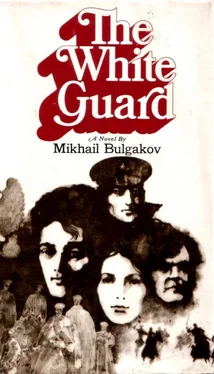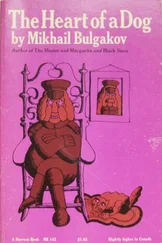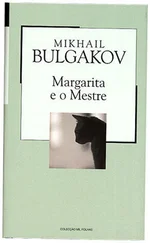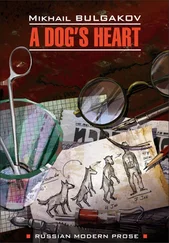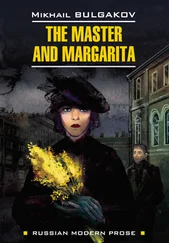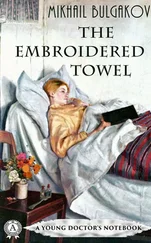MIKHAIL BULGAKOV - THE WHITE GUARD
Здесь есть возможность читать онлайн «MIKHAIL BULGAKOV - THE WHITE GUARD» весь текст электронной книги совершенно бесплатно (целиком полную версию без сокращений). В некоторых случаях можно слушать аудио, скачать через торрент в формате fb2 и присутствует краткое содержание. Жанр: Русская классическая проза, на английском языке. Описание произведения, (предисловие) а так же отзывы посетителей доступны на портале библиотеки ЛибКат.
- Название:THE WHITE GUARD
- Автор:
- Жанр:
- Год:неизвестен
- ISBN:нет данных
- Рейтинг книги:3 / 5. Голосов: 1
-
Избранное:Добавить в избранное
- Отзывы:
-
Ваша оценка:
- 60
- 1
- 2
- 3
- 4
- 5
THE WHITE GUARD: краткое содержание, описание и аннотация
Предлагаем к чтению аннотацию, описание, краткое содержание или предисловие (зависит от того, что написал сам автор книги «THE WHITE GUARD»). Если вы не нашли необходимую информацию о книге — напишите в комментариях, мы постараемся отыскать её.
Copyright © 1971 by McGraw-Hill Book Company.
Library of Congress Catalogue Card Number: 70-140252 08844
Printed in Great Britain
THE WHITE GUARD — читать онлайн бесплатно полную книгу (весь текст) целиком
Ниже представлен текст книги, разбитый по страницам. Система сохранения места последней прочитанной страницы, позволяет с удобством читать онлайн бесплатно книгу «THE WHITE GUARD», без необходимости каждый раз заново искать на чём Вы остановились. Поставьте закладку, и сможете в любой момент перейти на страницу, на которой закончили чтение.
Интервал:
Закладка:
On the whole my friend and I proved to be incompetent reporters. We forgot to take a camera with us, we had sat there, I in the armchair and he on the divan, as if we had been strapped down, we never went into the other rooms, and we failed to ask about the fate of Vasilisa . . . And yet perhaps that is as it should be. After all, we were not reporters, and what we did find out was interesting enough. And I can photograph the house any time I like - it will be there for a long time yet.
That was all.
We said goodbye and left, promising to come back again. But I doubt if we ought to.
At present I am curious about one thing only: will the inhabitants of that little hillside house read about the events which took place in it almost fifty years ago? 3
As we climbed back up St Andrew's Hill, thrilled yet saddened, we tried to draw some kind of conclusions. Conclusions about what? Well, about everything. The past, the present, things that never were. At Yalta in the summer of 1966 we read Yermolinsky's memoirs of Bulgakov, which have just been published in the magazine Teatr: they are very sad, not to say tragic. We had just been exploring the haunts of Bulgakov's youth, we still had to visit
3. Events ? What events ? The White Guard is fiction. But what fiction, when I can quite seriously and spontaneously write a sentence like the one printed above. And I have decided not to alter it, but just to add this footnote.
the erstwhile First Gimnaziya 4(the building is now part of Kiev University), on whose main staircase Alexei died (on the Moscow Art Theater stage), we would go to the delicatessen store on Teatralnaya Street which was once Madame Anjou's shop, Le Chic Parisien, with its bell that rang every time the door was opened, then we planned to try for the nth time to find the house on Malo-Provalnaya Street. Just around the corner of 'the most fantastic street in the world' - a moss-grown wall, a gate, a brick path, another gate, still another, a garden of snow-covered lilac bushes, a lantern in front of an old-fashioned porch, the gentle light of a tallow candle in a candlestick, a portrait with gold epaulettes, Julia . . . Julia Alexandrovna Reiss . . . No sign of her. And the house was not there either. I had reconnoitred the whole of Malo-Podvalnaya Street. There had once been, at the far end of a courtyard, a wooden house that roughly corresponded to Bulgakov's description complete with verandah with colored glass panes, but it had long since vanished. In its place there was a new multi-storey stone building, looking hideously out of place in that crooked little street, while alongside it a six hundred feet high television mast thrust itself skywards . . .
As we walked away up St Andrew's Hill we wondered why neither Bulgakov nor any of his brothers and sisters had ever felt drawn to come back here. His brothers, of course, could hardly have done so: Nikolka was dead, buried in some Parisian cemetery, whilst Vanya . . . Could it be that I had seen him, even met him? I was once in Paris, in a Russian restaurant not far from the Boulevard Saint-Michel. It was called 'Le vodka'. They had served real vodka there, which is not so common in normal French restaurants, some elderly people at the next table who had had a little to drink had sung old Russian songs, and on a little stage in the corner six balalaika players in blue silk Russian shirts had played three encores of 'Ochi chyorniye' ... I had talked to them; all except one were Russian. They didn't tell me their surnames,
4. In pre-revolutionary Russia a state secondary school, originally modelled on the Prussian Gymnasium and roughly equivalent to an English grammar school.
But all of them wanted to know how they could return to Russia. Perhaps one of them was Vanya Bulgakov, the man who for me and for all of us was - Nikolka Turbin? If he was playing 'Ochi chyorniye' on the balalaika now, might he not have played an army marching song to the guitar as a cadet in 1918?
How I long for a sequel to The White Guard! A childish curiosity makes me want desperately to know what happened afterwards, what fate befell the Turbins and their friends after 1918. Exile? For Nikolka the answer is clearly yes. As for Myshlaevsky - I don't know. And what about Shervinsky and Elena? And Alexei? Did he write The Days of the Turbins and The White Guard? And die in 1940, so long before the triumphal recognition of his writing which came twenty-five years later?
How I regret now not having known Bulgakov. How keenly I long to know the how, the where and the why in the genesis of his novel.
In 1923 his mother died of typhus. The White Guard was begun in 1923. And it opens with the funeral of the Turbins' mother: 'For the reigning head of the family, their adored mother, was no longer with them.'
I am just re-reading The Master and Margarita, and I now understand very clearly the real-life origin of the flood caused by Margarita in Latunsky's apartment.
And Maxudov in The Theatrical Novel is not writing Black Snow but The White Guard: '... It's evening, the lamp is burning; it has a fringed shade. Music lies open on the grand piano. Someone is playing Faust. Suddenly Faust stops and a guitar starts playing. Who is playing it? Here he comes, with the guitar in his hands . . .' 5
Nikolka . . . Nikolka again . . . Greetings, Nikolka, old friend of my youth . . .
There I've said it: The friend of my youth, it appears, was no more and no less than a White officer-cadet. But I cannot reject
5. M. Bulgakov Black Snow. A Theatrical Novel. (Hodder and Stough-ton; London 1965), p. 63.
him or deny him, nor his elder brother. Norhis sister, nor his brother's friends ...
For I fell in love with those people and I love them to this day. I love them for their honesty, their nobility and their bravery, and ultimately for the tragedy of their position. I love them, just as the hundreds of thousands of people loved them who saw the play at the Moscow Art Theater. 6And among them was Stalin. According to the M.A.T. records he saw The Days of the Turbins no less than fifteen times! And he could hardly be called the keenest of theatergoers . . .
The Turbins' apartment was destroyed by fire at Minsk in 1941. And although it rose from the ashes again thirteen years later, this time not in one but in three versions (the play was revived in Moscow, in Tbilisi and in Novosibirsk), for me there was only one genuine one, the set (hateful word for something so real!) designed by the artist Ulyanov. It is gone forever. Just as the actors in the original cast, Khmelyov, Dobronravov, Kudryavtsev, are gone for ever, the ones who first made us fall in love with the real-life (or maybe they were fictional, well perhaps half- or quarter-fictional -God, I've made the same mistake again!) heroes of Bulgakov's play.
We have known them so long - forty years in fact (incidentally we are now as far away in time - even three years longer - from the last M.A.T. production of the play as was that performance from the events it describes). Why has our friendship with them not only not waned over so many years (for they have acquired new friends too) but actually grown stronger? Why did I love them even more when I saw the revived production?
At first I could not give a precise answer to that question. Now I can.
I loved the Turbins even more just because it was they who first introduced me to Bulgakov.
Forty years ago, there's no point in concealing it, I was much less interested in Bulgakov (as a writer, and still less as a person)
6. Not less than a million, in my estimation. In the fifteen years from 1926 to 1941 the play ran for 987 performances, with an audience of at least i.ooo people each time.
Читать дальшеИнтервал:
Закладка:
Похожие книги на «THE WHITE GUARD»
Представляем Вашему вниманию похожие книги на «THE WHITE GUARD» списком для выбора. Мы отобрали схожую по названию и смыслу литературу в надежде предоставить читателям больше вариантов отыскать новые, интересные, ещё непрочитанные произведения.
Обсуждение, отзывы о книге «THE WHITE GUARD» и просто собственные мнения читателей. Оставьте ваши комментарии, напишите, что Вы думаете о произведении, его смысле или главных героях. Укажите что конкретно понравилось, а что нет, и почему Вы так считаете.
